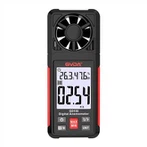Infrared thermometer optional
1. Understand the measurement temperature range
The temperature measurement range is the most important performance index of the infrared thermometer. Each type of thermometer has its own specific temperature measurement range. According to the measurement requirements, select an infrared thermometer with an appropriate range.
2. Understand measurement accuracy and minimum resolution
The measurement accuracy is the only indicator to ensure the accuracy of the measurement; it is also the key indicator to determine the performance of the infrared thermometer. Resolution is the smallest measure when measuring a specific temperature.
3. Understanding emissivity
The material and color of the surface of the measured object are different, and their ability to emit infrared energy to the outside is not the same. Measurement errors due to materials can be reduced by adjusting the emissivity.
4. Know your target size
For monochromatic thermometers; when measuring temperature, the area of the target to be measured should fill the field of view of the thermometer. For colorimetric thermometers, when the measured target is small and does not fill the field of view, it will not affect the measurement results.
5. Understand the distance factor ratio (D:S)
Refers to the ratio of the distance D between the infrared thermometer to the target and the diameter S of the measuring spot. If you are far away from a target with a small diameter, you should choose a high-ratio infrared thermometer. The higher the distance factor ratio, the higher the cost of the infrared thermometer.
6. Know the wavelength range
The emissivity and surface properties of the target material determine the corresponding wavelength of the pyrometer's spectrum. For high reflectivity alloy materials, there are low or varying emissivities.
7. Know Response Time
The choice of the response time of the infrared thermometer should be adapted to the situation of the measured target, and the determination of the response time is mainly based on the target's movement speed and the target's temperature change speed.
8. Be aware of environmental conditions
The environmental conditions of the thermometer have a great influence on the measurement results, which should be considered and properly resolved; otherwise, it will affect the temperature measurement accuracy and even cause damage.






